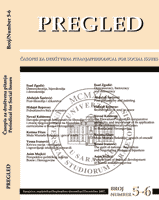Filozofija i istina / Filozofija i napredak
Philosophy and truth/Philosophy and progress
Author(s): Abdulah ŠarčevićSubject(s): Philosophy
Published by: Univerzitet u Sarajevu
Keywords: post-philosophy; the ideal of a liberal and solidary society; ironism and theory; neopragmatism and postmodernism; “the hopes of a liberal society in a non-rationalist and non-universalist manner;” cognition and contingency; freedom;
Summary/Abstract: This is in fact an American version of postmetaphysical thought, which found its fullest expression in Rorty. Fascination proceeds along by ways and subterranean routes: via French and Italian “postmodernism,” via this reception of Heidegger and Hans-Georg Gadamer, via Apel and Habermas, via the so-called post-empirical theory of knowledge of Thomas Kuhn and other proponents of the “New Philosophy of Science.” Facit: Fascination, seemingly, prompted by Rorty’s neopragmatism; in “releasing philosophical discourse, rhetorically cum aesthetically, from the argumentative discourse of science,” in a version of post-Wittgenstein neopragmatism of the West which – as Apel rightly establishes – is based on the “tendentious de-transcendentalization and historicization of quasi-transcendental problems of life- and world-constituting import” (M.H., S. 133). Further, fascination lies in the specific American reception of Heidegger. It is because of this that a kind of redefinition of postmetaphysical thought is taking place in America, where it is becoming post-philosophical. For Rorty, objectivity and metaphysicality are of merely idiosyncratic value. The case of Rorty is indeed about the postmetaphysical in a specific sense. There is no fixed, absolute vocabulary. The notion that there could be a meta-vocabulary capable of predicting new vocabularies is merely a new version of the old dream of “presentia”, from which ironists have been trying to awaken ever since Hegel. For instance, when reflecting on Derrida’s position, Rorty does not resort to “objectivity,” to eternally valid principles of judgment.
Journal: PREGLED - časopis za društvena pitanja
- Issue Year: XLVIII/2007
- Issue No: 3-4
- Page Range: 151-184
- Page Count: 34
- Language: Bosnian

